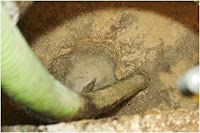The reason is that concrete and metal interceptors inevitably fail over time and have to be replaced - and it ain't cheap to do that!
For those interested in why concrete and metal interceptors keep failing, an understanding of what is going on inside the interceptor may be of importance.
Whats wrong with concrete?
 |
| Concrete interceptor with hole in the bottom |
Even worse is what happens to grease over time as it collects in the interceptor. As FOG breaks down in an interceptor, anaerobic bacteria convert naturally occurring sulfate molecules into sulfides, which form hydrogen sulfide gas (H2S) in the free air space of the interceptor. Airborne aerobic bacteria consume hydrogen sulfide gas and convert it into sulfuric acid (H2SO4) in the wastewater of the interceptor. Sulfuric acid reacts with calcium hydroxide (Ca(OH)2) in concrete forming calcium sulfate (CaSO4) that in the presence of water (H2O) creates gypsum (CaSO4·2H2O). Gypsum is essentially a soft coating on the surface of the concrete that is easily washed off during pumping maintenance exposing aggregate over repeated cycles.
 |
| Schier GB-250 fitted inside a ruptured 1000 gallon concrete gravity interceptor |
Products like Schier's Great Basin interceptors are a popular choice for contractors and restaurant owners in replacing failing concrete gravity interceptors because of their compact size, high grease storage capacity, HDPE construction and lifetime warranty. The Great Basin can be retrofitted directly inside of the concrete interceptor reducing the cost of excavation, backfill, and overall installation cost.
Green Turtle's Proceptor series interceptors are also a good choice in replacing failed concrete interceptors as they are made from a very durable and long lasting fiberglass resin and come with a 30 year warranty.
Whats wrong with metal?
 |
| Rusted out metal interceptor |
Many grease interceptor manufacturers still use metal today with a "corrosion resistant" coating on the interior of their units. Unfortunately the process for pumping out and cleaning these devices invariably scratches the coating leaving bare metal exposed. The average lifespan of a metal grease interceptor is approximately 5 years.
When you have a choice on what to recommend, specify or approve for a project, consider the materials of construction involved - it really does matter!
Fine way of telling, and pleasant article to obtain facts about my presentation focus, which i am going to present in institution of higher education.
ReplyDelete--------------------
Montgomery custom home Builder
wich kind is more effect ?
ReplyDeleteI feel really happy to have seen your webpage and look forward to so many more entertaining times reading here. Thanks once more for all the details.
ReplyDeleteDel Mar Masonry Contractors
I really loved reading your thoughts; obviously you know what you are talking about! Your site is so easy to use too, I’ve bookmark it in my folder
ReplyDeleteConcrete Patios Houston